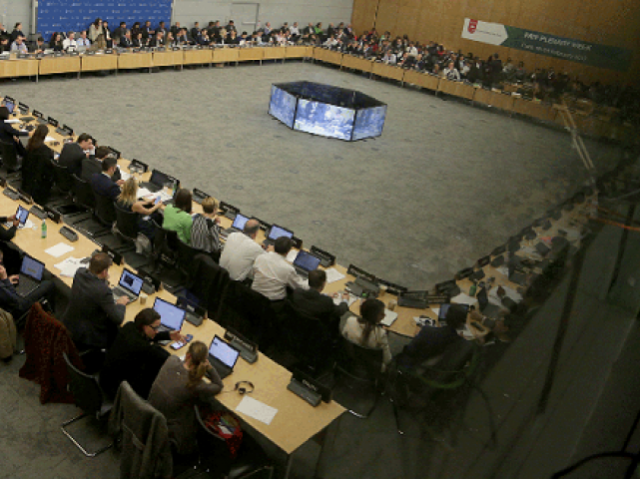FATF urges Pakistan to reassess militant outfits’ ranking
Pakistan to stay in grey list despite Indian attempts; has now two more months to satisfy concerns

Pakistan to stay in grey list despite Indian attempts; has now two more months to satisfy concerns.
PHOTO: FILE
The global body, working to curb money laundering and terrorism financing, also urged Pakistan to swiftly implement its 27-point Action Plan. Pakistan will remain on the FATF grey list, although India tried to get it blacklisted.
Pakistan has now two more months to satisfy the FATF’s concerns, as it now has to deliver on 16 more action points by May in addition to five outstanding points that originally had to be met by January this year. The face-to-face meeting of the Review Group will now take place in April before FATA again reviews Pakistan’s case.
“Pakistan has revised its TF (terrorism financing) risk assessment, however, it does not demonstrate a proper understanding of the TF risks posed by Da’esh, AQ, JuD, FiF, LeT, JeM, HQN, and persons affiliated with the Taliban,” said an FATF public statement issued after its week-long plenary meeting.
'India presses for Pakistan to stay on terror financing list'
In its Terrorism Financing Risk Assessment Report, Pakistan assessed majority of these organisations except Taliban and Haqqani network as low to medium risk entities, said a Pakistani delegate while speaking on condition of anonymity. He said the FATF was of the view that all of these organisations including JeM pose high risks to other countries.
The JeM took responsibility of February 14 attack at Pulawma in Indian Occupied Kashmir (IOK). India immediately blamed Pakistan after a young suicide bomber, a native of the IOK, drove his explosive laden vehicle into a convoy of Indian security forces, killing nearly three dozen soldiers.
Pakistan on Thursday also banned Jamaat-ut-Dawa (JuD) and Falah-e- Insaniat Foundation (FiF)– two organisations that India believes are front for the banned Laskhar-e-Taiba (LeT). The FATF wanted Pakistan to treat these eight outfits as high risk entities and take actions against them accordingly.
Pakistan has taken steps towards improving AML, CFT: FATF
India was at forefront to get Pakistan blacklisted during the International Cooperation Review Group (ICRG) meeting but it did not press the demand during the final plenary meeting. India was backed by the United States and other powers, said a Pakistani official.
Pakistani authorities claimed that they managed to convince the FATF about the progress they have so far made on implementation of the action plan. They said the additional information that Pakistan shared with the Review Group after the last month’s meeting could not be evaluated
“Given the limited progress on action plan items due in January 2019, the FATF urges Pakistan to swiftly complete its action plan, particularly those with timelines of May 2019,” said the public statement.
Since June 2018, Pakistan has made a high-level political commitment to work with the FATF and APG to strengthen its anti-money laundering and countering financing of terrorism (AML/CFT) regime and to address its strategic counterterrorist financing-related deficiencies.
“Pakistan has taken steps towards improving its AML/CFT regime, including by operationalising the integrated database for its currency declaration regime,” said the FATF. “Pakistan should continue to work on implementing its action plan to address its strategic deficiencies.”
Pakistan is again asked to adequately demonstrating its proper understanding of the TF risks posed by the terrorist groups and conducting supervision on a risk-sensitive basis.
It has to demonstrate that remedial actions and sanctions are applied in cases of AML/CFT violations, and that these actions have an effect on AML/CFT compliance by financial institutions.
The country should demonstrate that facilities and services owned or controlled by designated person are deprived of their resources and the usage of the resources.
Pakistan will also has to show that competent authorities are cooperating and taking action to identify and take enforcement action against illegal money or value transfer services (MVTS).
The FATF also underlined that the country needs to show that the authorities are identifying cash couriers and enforcing controls on illicit movement of currency and understanding the risk of cash couriers being used for TF.
The inter-agency coordination including coordination among provincial and federal authorities on combating the TF risks has also been emphasised again by the FATF.
Pakistan is also required to demonstrate enforcement against the TF violations including administrative and criminal penalties and provincial and federal authorities cooperating on enforcement cases



















COMMENTS
Comments are moderated and generally will be posted if they are on-topic and not abusive.
For more information, please see our Comments FAQ